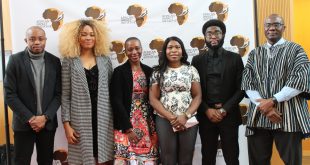The Equator Initiative is a United Nations-led partnership that brings together governments, civil society, grassroots organizations, and businesses to foster resilient communities by recognizing and advancing local nature-based solutions for sustainable development. The Equator Initiative creates opportunities and platforms to share knowledge and good practices, develops capacities of local communities and indigenous peoples, informs policy through convening multi-stakeholder dialogues, and fosters enabling environments to replicate and scale up community action.
The Equator Prize 2020 will be awarded to outstanding local community and indigenous peoples initiatives that advance innovative nature-based solutions for sustainable development. The winners will join a prestigious network of 245 leading community-based organizations from 81 countries that have been awarded the Equator Prize since 2002. Each Equator Prize winner will receive USD 10,000 and will be supported to participate in a series of policy dialogues and special events during the IUCN World Conservation Congress in Marseille, France, in June 2020.
Equator Prize 2020 Theme: Nature for Life
This year’s Equator Prize will recognize innovative initiatives from local communities and indigenous peoples that demonstrate exceptional achievements in the area of nature-based solutions for local sustainable development. Winning initiatives will be honored for their successes in protecting, restoring and/or sustainably managing biodiversity for positive development outcomes. Thematic priorities include:
- Nature for Prosperity. Protection, restoration and/or sustainable management of terrestrial or marine ecosystems, biodiversity, and/or wildlife that enables sustainable and green livelihoods, enterprises and jobs; including indigenous economies.
- Nature for Water. Protection, restoration and/or sustainable management of ecosystems for water security.
- Nature for Climate. Protection, restoration and/or sustainable management of ecosystems that help mitigate greenhouse gas emissions, and/or help communities adapt to the impacts of climate change.
In addition, the activities of successful nominees should ideally deliver on several Sustainable Development Goals simultaneously. For example, initiatives may improve food security, reduce poverty and inequality, or provide access to clean water. Special consideration will be given to nominees working on ecosystem intactness and integrity, advocacy for land and water rights, social and environmental justice, and gender equality.
Local nature-based solutions for sustainable development
The Equator Prize 2020 nomination process will offer community-based initiatives the opportunity to share their work on the Equator Initiative’s web portal of local nature-based solutions for sustainable development. The platform connects communities around the world and shares local solutions that work for people and planet. Participation in this platform is optional when submitting nominations for the Equator Prize.
Eligibility Requirements
To be eligible for the Equator Prize 2020:
- The initiative must have existed for at least three years or the actions carried out must have taken place for at least three years.
- The nominee must be either a local community-based initiative, operating in a rural area, based in a country receiving support from the United Nations Development Programme (for a list of eligible countries, please click here); o una iniciativa liderada por pueblos indígenas en cualquier país, que actúe en un área rural.
- The actions taken by the nominee must be nature-based, and must deliver benefits related to two or more Sustainable Development Goals (SDGs).
Selection Criteria
Equator Prize 2020 winners will be selected by an independent Technical Advisory Committee, which will assess nominations based on the following criteria:
- Impact: The extent to which the nominated initiative has resulted in measurable and positive environmental, social and economic impacts that deliver benefits towards the achievement of the Sustainable Development Goals;
- Innovation: The extent to which the nominated initiative demonstrates new approaches and models that overcome prevailing constraints, and could offer fundamentally new approaches to adapting to and/or mitigating climate change, while advancing local sustainable development;
- Scalability and/or replicability: The extent to which the nominated initiative could be scaled up sub-nationally or nationally and/or, the extent to which the initiative can be replicated within the country and beyond;
- Resilience, Adaptability, and Self-Sufficiency: The extent to which the nominated initiative demonstrates adaptability to environmental, social and economic change, resilience in the face of external pressures, and improved capacity for local self-sufficiency;
- Reduced inequalities: The extent to which the initiative reduces inequalities in income as well as those based on age, sex, disability, race, ethnicity, origin, religion or economic or other status, in particular for the poor;
- Social Inclusion: The extent to which the nominated initiative includes youth, elders, indigenous peoples, and other diverse groups in the decision-making processes and the actions that affect them;
- Gender Equality: The extent to which the nominated initiative promotes the equality and empowerment of women and girls.
Please Note:
- Nominators are encouraged to quantify results and include data that demonstrates positive impacts in their submissions.
- Nominations may be submitted either directly by the initiative or community, by a partner organization, or by any third party that is sufficiently familiar with the activities and achievements of the initiative or community.
- Nominators must indicate whether they agree to have the solution highlighted in the Equator Initiative web portal on local nature-based solutions for sustainable development.
- Nominated initiatives will undergo a verification process that may require nominees and/or nominators to provide additional information and/or materials.
- Nominations may be submitted in: Arabic, Chinese, English, French, Indonesian, Portuguese, Russian or Spanish.
- Nominations must be submitted by 9 January 2020.
Nominations may be submitted through our online nomination system. If you are having technical issues, please contact us at prize@equatorinitiative.org.
 medjouel.com Study Non Stop
medjouel.com Study Non Stop
